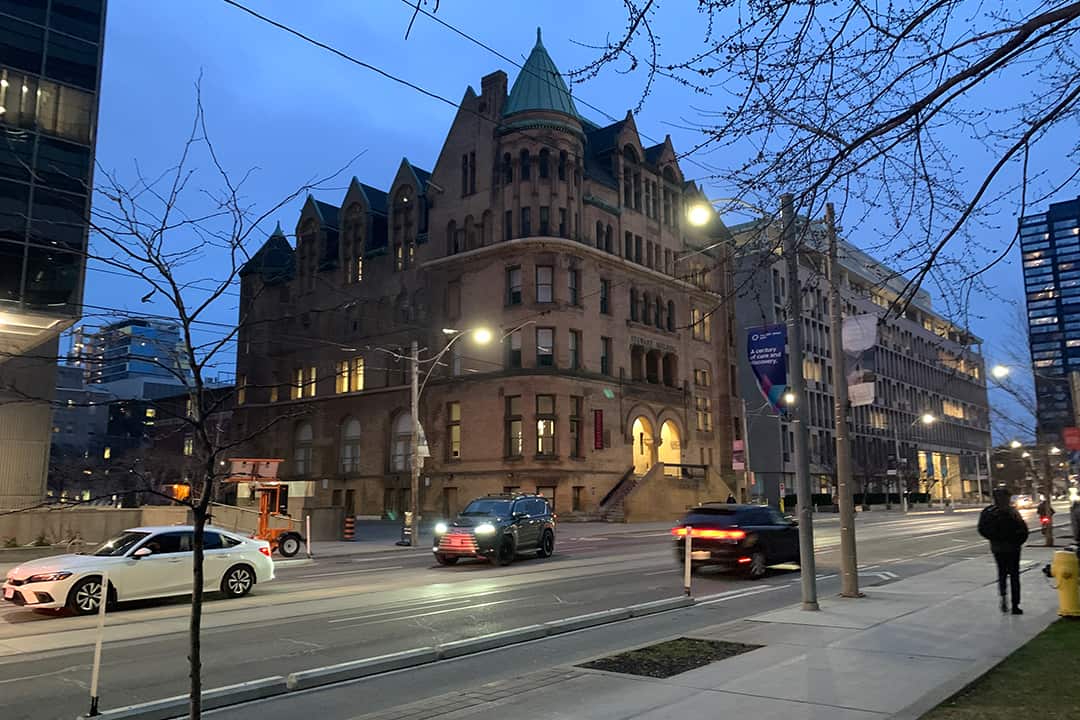Over 400 real estate developers and Canadian university real estate executives convened at the University of Toronto for a real estate conference last November to talk about student housing — and to hear the announcement that a for-profit real estate investment trust (REIT) had acquired U of T’s Stewart Building.
The buyer, Alignvest Student Housing (ASH) REIT, plans to convert the building into a high-rise, mixed-use building that will include student housing. Alignvest already owns 12 student housing properties across Canada, which house a total of 5,208 students and represent $945.3 million in total value.
Behind the November conference was private, US-based real estate consulting firm CAPRE Omnimedia Ltd. This was one of many conferences that CAPRE has hosted in Canada and the US as part of the company’s Student Housing and University Real Estate initiative (SHURE). The SHURE initiative’s website states that its purpose is “to improve student lives and enhance the built environment in university neighbourhoods.”
Despite these intentions, the Stewart Building announcement, and the SHURE conference where industry leaders heard it, have prompted criticism from student housing activists around increasing privatization in student housing across Canada.
Insufficient student housing
This is one of many recent partnerships between Toronto universities and private real estate developers. Knightstone Capital Management developed Campus One at U of T in 2017 and Parkside residence near Toronto Metropolitan University in 2015, for example, and Forum Equity Partners Inc. and Campus Suites’ partnered with York University to develop the Quad Student Housing Community, which was completed in 2017.
Investment trusts like ASH REIT make it possible for individuals to pool funds together and invest in for-profit real estate properties without being directly responsible for their ownership and management. Critics of large-scale investments in real estate believe that such investments contribute to artificially higher property prices and rents — especially in high-demand urban areas.
Canada is in the middle of a massive housing shortage. It needs approximately 3.5 million additional housing units by 2030 to make housing as affordable as it was in 2004, and Ontario shoulders the largest share of this demand.
Further complicating the issue is Canadian universities’ increasing recruitment of international students, which has sparked polemic debates on the housing crisis, given the way that universities have relied on international student tuition fees to maintain their bottom lines.
In response to questions about the Liberal government’s proposed cap on international student visas as a strategy to combat the housing crisis, former federal housing minister Sean Fraser argued that some educational institutions aren’t building up the necessary infrastructure to support their international students. “I’m convinced [some institutions] have come to exist purely to profit off the backs of vulnerable international students rather than providing quality education,” said Fraser last August, “[especially] when you see some of these institutions that have five, six times as many students enrolled as they have spaces for them in the building.”
Concerns with private development
Aidan Thompson, vice-president of university and public affairs for the University of Toronto Students’ Union (UTSU), is doubtful that SHURE will further student interests. He claimed in an interview with The Varsity that the SHURE conference, by inviting so many private developers and investors, seems to prioritize profit incentives over student and community interests. However, Thompson noted that SHURE invited several non-profit organizations, including the UTSU, to the conference.
Michael Jodah, executive director of HOUSE Canada — a non-profit affordable housing development organization formed and owned by student union locals from across Canada — criticizes increased privatization in student housing.
“The private student housing development sector is trying to push non-profit student housing solutions to the margins,” he said in a statement to The Varsity. As an example, Jodah pointed to Wilfrid Laurier University’s sale of university land to a private developer, against its student unions’ requests to turn that land into a non-profit student housing co-operative.
Jodah asserted that when private developers partner with public universities to secure portions of campus land and university funding to use in for-profit developments, they profit off of students and taxpayers in the process.
HOUSE Canada urges that community-based, non-profit housing solutions are better at fostering sustainable, mixed-use development as well as stronger public oversight and accountability. “We are not against private student residences,” Jodah said. “[But] it is critical that we use publicly owned resources like university-owned land to build housing that is deeply affordable for students who might otherwise be priced out of housing entirely, or forced to live far away.”
U of T did not respond to The Varsity’s request for comment.



No comments to display.